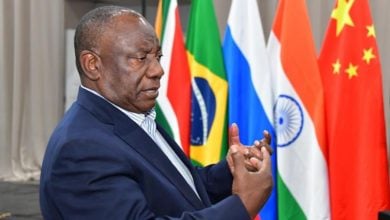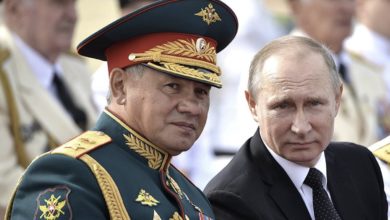The following is a rapid-response orientation from the PSL’s Executive Committee on the growing struggle inside the ruling class. The PSL is mobilizing fully to protest Trump’s right-wing agenda at his Jan. 20 Inauguration, but opposes those who would like to funnel the anti-Trump grassroots movement behind the Democratic Party leadership, which will either embrace or capitulate to Trump’s anti-people domestic program, and only is trying to force his administration to adopt their anti-Russia neoconservative foreign policy.
The internal struggle within the summits of the U.S. capitalist political establishment between different factions, cliques and groupings has sharpened. It is now crystal clear that the CIA has mounted a covert operation in collusion with some mainstream media outlets, including CNN, against Donald Trump. The CIA campaign, under John Brennan, aims to discredit Donald Trump so as to box in his foreign policy with respect to Russia and the Middle East, and potentially prevent him from becoming president of the United States.
The unverified dossier that was leaked alleges that Trump was the target of a Russian intelligence operation and that the Russian government possessed compromising information about Trump’s purported conduct at the Ritz-Carlton in Moscow several years ago. The alleged connection between Trump operatives and Russian intelligence has all the hallmarks of the kind of CIA operations that have been conducted against heads of state and targeted political leaders in other countries around the world.
The dossier is unverified and unsubstantiated but was deemed to be “credible” by Brennan, head of the CIA. It was presented in highly classified briefings to both President Obama and President-elect Trump. Immediately after the classified briefings, this “dossier” was leaked to CNN and published by Buzzfeed.
The Russian government immediately denounced the report as a fabrication and a forgery and claimed that those behind the leaks were attempting to sabotage the possibility of improved bilateral relations between the United States and Russia.
The release of the information by the CIA leadership just days before Trump is scheduled to assume the presidency cannot be interpreted as anything other than an effort to end his presidency before it starts or to force Trump to abandon his efforts to improve relations with Russia.
The struggle against Trump’s right-wing program must be independent
Modern-day capitalism and imperialism is inherently unstable — especially now in the context of declining U.S. global power — and the struggles within the establishment are a symptom of that instability.
It is ridiculous and wrong for any section of the U.S. progressive, working-class or socialist movement to affix itself to one or another faction within the capitalist establishment or state apparatus.
Sadly, because of the profound lack of class consciousness, different parts of the progressive movement are now echoing the talking points of one faction of the establishment in their struggle against another. This is especially true within the broad category of what might be called “liberal public opinion,” which is traditionally affixed to the Democratic Party establishment.
The failure to be politically independent from that faction of the ruling class makes the movement susceptible to embracing an absolutely reactionary political program: antagonism towards Russia and defense of the murderous CIA! Some are going so far as to say that the anti-war opposition to Clinton, and the progressive sentiments expressed in the Sanders campaign, were all part of some Russian plot.
We oppose Donald Trump’s campaign and government because it is a right-wing, racist, sexist, pro-capitalist and anti-worker regime. Our opposition has nothing in common with the opposition to him from the CIA, the Democratic Party leadership, or its liberal followers now echoing the reactionary claims that Trump should be opposed as a “tool of Russia.”
CIA and foreign policy establishment trying to stop Russia reorientation
The CIA clearly favored Hillary Clinton in the election campaign because she proposed a much harder line than President Obama in support of CIA covert wars and covert operations in Syria, Ukraine and in Russia itself.
Trump has also ridiculed the CIA since he was elected, in an unprecedented manner for an incoming president. He has ridiculed and derided the CIA as the “same people who told us that Iraq had weapons of mass destruction.”
The other motive for the relentless attack against Russia and the promotion of the so-called “link” between Trump and Russia is to force the incoming administration into a political corner, requiring it to shift from its announced intentions to improve U.S.-Russia relations.
The CIA, the NSA, and the Pentagon fervently support a confrontational position against Russia in Eastern and Central Europe, in Asia, along Russia’s borders, and in the Middle East. Their opposition to an improvement in U.S.-Russia relations is based both on narrow bureaucratic and financial interests, and also reflect a consensus position on U.S. strategy to preserve global hegemony in the 21st century.
The two months of relentless assertions that Russia hacked the election, and tried to influence the outcome, and the application of intense pressure on Trump on that basis, is starting to have its effect. Trump and his cabinet picks have shifted in their presentation on Russia. At his first press conference held since the election, Trump agreed that Russia was behind the Clinton email hack. He had refused to do so until this time. He also said that relations will probably not be good with Russia and criticized Putin by name for the hack of the DNC emails. He also asserted that Russia will respect the United States more under his purportedly tougher leadership than under Obama or Clinton.
He also announced a new cyber-warfare plan that would strengthen U.S. capabilities in the coming months.
At almost the very moment that Trump was having his press conference, his nominee for Secretary of State — ExxonMobil CEO Rex Tillerson — who had been accused by the Democrats of being a “friend” of Putin went out of his way to make it clear that he too would be “tough” on Russia. He said:
“We must also be clear-eyed about our relationship with Russia. Russia today poses a danger, but it is not unpredictable in advancing its own interests. It has invaded Ukraine, including the taking of Crimea, and supported Syrian forces that brutally violate the laws of war. Our NATO allies are right to be alarmed at a resurgent Russia.”
Trump is fighting to defend himself against John Brennan’s CIA’s covert operations, as reflected in his strong position at the press conference today. But Trump and his team know full well that if the CIA or elements in its leadership were willing to carry out this kind of operation in the days before the presidential inauguration, similar operations could be taken after he is inaugurated.
This is a clear example of the state — the centralized, permanent and unelected institutions of state power (to call it the “deep state” is redundant and unnecessary) — trying to whip into line those politicians who disrupt or destabilize their plans.
The last period of sharp intra-class struggle, 1962-1980
It is of utmost importance for our movement to understand that the intra-class struggle within the bourgeoisie and inside the capitalist state apparatus is not an entirely new phenomenon. It may seem new at present because there has been a prolonged period of relative stability within the U.S. capitalist establishment.
But the recent period of stability — which began in the 1980s — was preceded by intense instability. There was a kind of warfare that was raging on between different ruling-class tendencies and factions in the 1960s and 1970s. In fact, the presidential elections of 1964, 1968, 1972, 1976 and 1980 — five straight — were profoundly impacted by sharp and violent struggles within the capitalist establishment. In the 1960s, it almost appeared as if the country had a government by assassination rather than “of, by and for the people.”
- The 1964 election of Lyndon Johnson took place because of the assassination of Kennedy in 1963. Kennedy had been the target of fierce right-wing opposition from within the CIA and the Pentagon for his policies in Cuba, Vietnam and U.S.-Soviet relations.
- In 1968, the sitting president, Johnson, declined to run for a second term because of the struggle within the establishment and in the streets over the unfolding military catastrophe in Vietnam. Robert F. Kennedy, who favored withdrawal from Vietnam, would have been elected that year except for the fact that he too was assassinated on the night he won the decisive California primary, which would have virtually assured his ascension to the White House. As we know now with certainty, the campaign of then-nominee Richard Nixon intervened with the South Vietnamese government behind the back of the Johnson White House in the summer of 1968 to sabotage the secret peace agreement being negotiated between the U.S., North Vietnam and South Vietnam that would have led to the withdrawal of US forces from Vietnam in 1969. Such a withdrawal would have secured an election victory for the Democrats.
- The 1972 election was also a three-way race between George McGovern, Richard Nixon and the ultra-rightist George Wallace. Wallace was felled by a would-be assassin’s bullet. Even though he survived, he was unable to complete his presidential run, allowing the Nixon camp to consolidate its control over the right and ultra-right forces that were mobilizing at that time.
- In 1974, however, Richard Nixon was driven from office, just 19 months after taking the oath of office, choosing to resign rather than be impeached. There is still a lack of clarity in the public about the driving forces behind the Nixon ouster — the so-called Watergate Scandal, which became a national political crisis. The pending impeachment of Nixon was based on reports published in the Washington Post by Bob Woodward and Carl Bernstein, but, as we learned four decades later, the source of the leaks that brought down Nixon was from the number-two official at the FBI. In other words, Watergate was a struggle within the capitalist state apparatus between the FBI and the White House, whereby FBI operatives utilized the mainstream media to carry out the destruction of Nixon.
A deeper division within the ruling class over the development of the Vietnam war was taking place. The progressive movement struggled for years against the war, but it was when a sector of the ruling class began to see the danger of continued involvement in Vietnam, coupled with further exposure from figures like Daniel Ellsberg, that the major media began to expose the Pentagon’s lies and supposed U.S. success. It was that opposition from within and breaking through of the truth to the U.S. public that a much wider and mass public opposition was able to grow. The ruling class effort to get rid of Nixon shared nothing in common with the progressive anti-Nixon sentiment at the time. It was not motivated by opposition to the Vietnam War nor his genocidal bombing campaigns. It was an internecine fight between different cliques within the establishment
- The 1976 election was shaped by Watergate. Nixon had appointed Gerald Ford as Vice-President so that he could resign and be pardoned. Ford, the Republican House Minority Leader from Michigan whose main claim to fame was his role in the Warren Commission covering up the Kennedy assassination, then ascended to the presidency when Nixon stepped down. He named Nelson Rockefeller as his running mate and pardoned Nixon. The main reason Jimmy Carter, an unknown on the national scene, could win is that the Republican administration was literally unelected appointees and had been so discredited. Carter was chosen precisely because he had no connections to the traditional Democratic base, especially the labor movement.
- From 1977 to 1980, the instability within the capitalist establishment grew even stronger under Carter. The nomination of Ronald Reagan as the Republican candidate signaled a profound and open split between one ruling-class group, the “Committee on the Present Danger” (a coalition of Pentagon generals, war-contractors and major oil companies) against the traditional Washington establishment dominated by Wall Street banks and the Council on Foreign Relations. Reagan was considered a true right-wing extremist at that time, an ultra-hawk and militarist.
- In 1980, Reagan was able to win the presidency because of the inability of the Carter administration to win the release of 52 American hostages seized by Iranian students in Tehran a year earlier. As it turns out, Iran decided not to release the hostages because it had entered into a secret agreement with Reagan’s political campaign (thus the origin of the term the “October surprise”). Reagan’s campaign secretly promised improved relations if Iran withheld the release of the hostages until he became president. Carter was viewed in the mainstream media as “weak” because of his failure to win the release of the American hostages and lost by a large margin. As if on cue, the Iranian government released the hostages just minutes after Reagan took the oath of office in January 1981. Reagan’s campaign manager, William Casey, who was alleged to have made the secret deal with Iran, was named the new head of the CIA.
The CIA and defense intelligence agencies have a well-known record of targeted killings and covert operations, character assassinations of political leaders, and interference in the political processes and governmental affairs of other countries. These kinds of nefarious activities, which are driven by imperialist calculations, are also carried out on U.S. soil. This includes the killings, frame-ups and character assassinations of progressive and revolutionary activists, as evidenced most spectacularly by the COINTELPRO operations carried out against Martin Luther King, Jr., Malcolm X, the Black Panther Party and their allies. Ruling-class factions will also resort to these same tactics in their struggles against their competitors within the establishment.
A new period of capitalist instability within the summits of power
Reagan initiated a vast expansion of militarism and military spending in the United States.
The Reagan/Bush I Era ended with the collapse or overthrow of the socialist governments in Eastern and Central Europe, followed soon thereafter by the collapse of the Soviet Union. During the 25 years since, the United States seemed to have strengthened its global position and also overcame the problem of intense intra-class struggle within the bourgeoisie. That period of stability seems to be over.
The presidential campaign of 2016 showed that this period of capitalist stability has shattered, at least momentarily. Usually elections allow the establishment to settle their differences “peacefully” and provide a degree of stability in the normal transition of power. But this year’s election continues to be different.
For revolutionary organizers and class-conscious workers, these events have to be studied closely and intensely. Generalities will not do. We must fortify our movement by persuasively intervening to steer it away from following the Democratic Party, the CIA, or any other force within the establishment. These forces will seek to utilize the media, or the movement itself, as a battering ram against their opposing factions within the oppressor class.
The anti-Trump movement must go in the opposite direction — the direction of struggle against that oppressor class as a whole.





